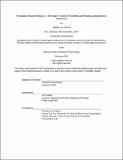Navigating climate resiliency : a developer's guide to permitting and planning along Boston's Waterfront
Author(s)
Plumb, William H.,S.M.(William Hoagland)Massachusetts Institute of Technology.
Download1251804606-MIT.pdf (4.599Mb)
Other Contributors
Massachusetts Institute of Technology. Center for Real Estate. Program in Real Estate Development.
Advisor
Jen Cookke.
Terms of use
Metadata
Show full item recordAbstract
The City of Boston, Massachusetts is vulnerable to coastal flooding and rising sea levels. Tidelands that have historically been filled-in to foster economic growth and prosperity are increasingly at risk as information on climate change continues to evolve. Recent studies have increased both awareness and regulations for development and redevelopment along high-risk coastal floodplains. Most notably, the City of Boston's Climate Ready Boston report has identified comprehensive planning efforts in Boston's highest-risk neighborhoods, which serve as the benchmark for Boston's planners, architects, and developers. Climate Ready Boston is one of many reports that have framed the discussion of climate resiliency and building for the City's future. Private developers must navigate increased scrutiny and permitting hurdles to execute large scale developments in vulnerable areas. This paper analyzes the growing issue at hand and the impact it has on both the City of Boston and the private sector. The analysis first looks at the risks Boston faces through the lens of Climate Ready Boston, associated initiatives and the stakeholders involved with pushing forward resiliency policy. The paper then explores the unique impact that coastal resiliency has on the permitting process in Boston and its implications for the private sector. A case study approach is then used to assess the current application of these plans and policies for two different locations in South Boston. Finally, the paper evaluates the ongoing challenges and possible policy changes to guide the development of future resiliency infrastructure.
Description
Thesis: S.M. in Real Estate Development, Massachusetts Institute of Technology, Program in Real Estate Development in conjunction with the Center for Real Estate, February, 2021 Cataloged from the official PDF of thesis. Includes bibliographical references (pages 75-77).
Date issued
2021Department
Massachusetts Institute of Technology. Center for Real EstatePublisher
Massachusetts Institute of Technology
Keywords
Center for Real Estate. Program in Real Estate Development.